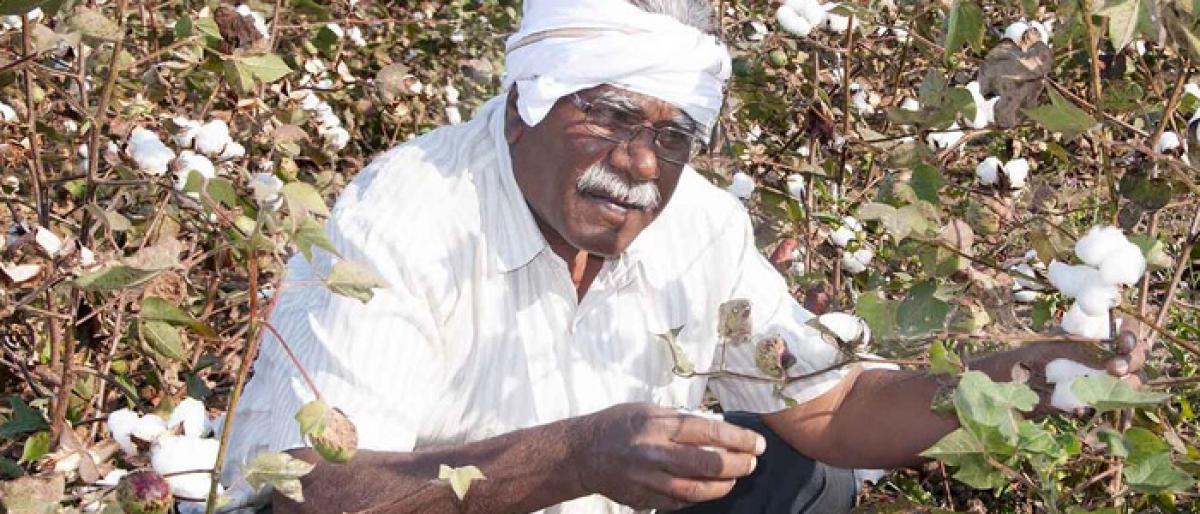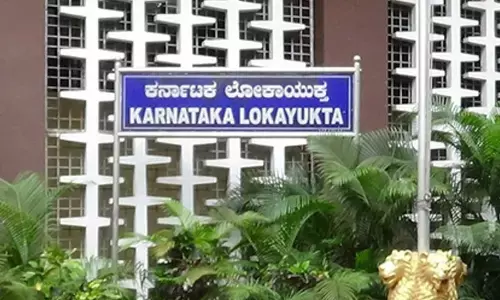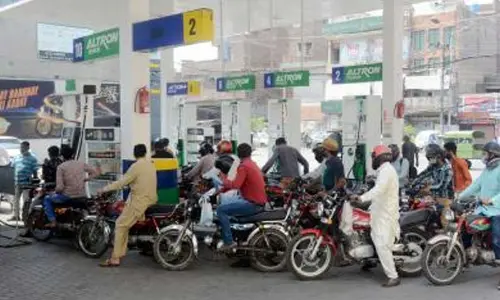Time farmers get their due

The TRS government recently reaffirmed last year’s decision of delivering Rs 4000 per acre twice a year from the State Treasury to all the 72 lakh farmers regardless of the size of their land holdings, purchase of inputs, price or quantity of crops sold or the crop grown and the nature of preparation required to grow it.
The TRS government recently reaffirmed last year’s decision of delivering Rs 4000 per acre twice a year from the State Treasury to all the 72 lakh farmers regardless of the size of their land holdings, purchase of inputs, price or quantity of crops sold or the crop grown and the nature of preparation required to grow it.
This input support scheme, or ‘Farmer investment support scheme’ as the Telangana government calls it, to be launched in May, is intended to cover the costs of inputs like fertilizers, seeds and pesticides.
Though the objective behind the measure is a step in the right direction, the blueprint of the scheme is a potential breeding ground for rampant corruption and might just result in another abysmal failure providing no solution to the prevalent agrarian distress.
The scheme seems to cold-shoulder tenant cultivators, who comprise 40 percent of the farmer population in the State. Moreover, they are usually the ones who are trapped in the vicious cycle of debt that is taking a catastrophic toll of the farming sector.
A study conducted by the Rythu Swarajya Vedika found out that 70-75 percent of the farmers, who committed suicide were small and marginal farmers comprising of landless agricultural laborers, tenant farmers who take lands on oral lease to grow their crops on.
In addition to facing crop losses, some farmers also have to bear the burden of land rental. The scheme provides for identifying potential beneficiaries by distributing land ownership passbooks to all 72 lakh farmers, which will serve as proof of land ownership and only then will the farmer be eligible for this monetary input transfer scheme.
The most disadvantaged class in the rural agriculture sector remains untouched by this scheme, while absentee landlords who lease out their lands would be the ones benefiting out of this subsidy transfer. The archaic Andhra Pradesh (Telangana Area) Tenancy and Agricultural Lands Act, 1950 discourages landlords from renting out their land to tenant cultivators via a legal lease agreement.
This complicates the process of providing for a system within the fabric of legal system of transferring the benefits of the subsidy from the landlord to the tenant farmer. In addition, with no cap on the size of the land holding, the scheme will greatly benefit the rich and established farmers.
A farmer owning 100 acres of land would be entitled to Rs eight lakh per annum in subsidy via this scheme. Around 98 percent of the farmers in the State own less than 10 acres of land with a majority holding less than 2 hectares which doesn’t even entitle to the minimum Rs. 8,000 per acre every year. Lessons from the past prove that badly targeted subsidies end up benefiting the richest beneficiaries a lot more than the poorest beneficiaries.
The TRS government plans to hand out these subsidies in the form of cheques tainted in the TRS party’s official colour of pink instead of DBT to the bank accounts of farmers. This regressive decision of handing out cheques will incubate widespread corruption with no mechanism to plug leakages and lack of transparent system in place to monitor if the intended beneficiaries are receiving their subsidies.
In the past, giving direct cash transfers in lieu of subsidies has often resulted in inefficient delivery with beneficiaries reporting that they have not received the cash that they are entitled to which will further cost them more time and money as grievance redressal mechanisms are inadequate. The success of DBT schemes in India is a stellar evidence of its effectiveness in hitting corruption at its roots and enhancing fiscal savings.
By getting rid of intermediaries and middlemen, DBT has proven to curb the rampant system of illicit commission which is often gobbled by corrupt officials from beneficiaries since these officials are capable of holding their subsidies hostage. Executing this scheme via cheque transfers will revive the mammoth ecosystem of corruption prevalent in the Indian subsidy regime. Given how smoothly DBTs have been implemented by the central government across a plethora of Centrally Sponsored Schemes (CSS), the merger of DBT with the scheme would receive huge support from beneficiaries.
Projecting the total subsidy sum of Rs.8,000 per acre covering almost 72 lakh farmers in the state, the farmer investment support scheme is estimated to cost the state exchequer a whopping Rs 9600 crore. Combined with the TRS government’s 24-hour supply scheme for the state’s more than 23 lakh agricultural pump-sets the state would incur an annual expenditure of Rs 16,000 - 16,500 crore which is over a tenth of the government’s budgeted expenditure of Rs 1,49,646 crore and more than 14 percent of its revenue receipts for 2017-18 after including share of central taxes and grants-in-aid. In the past, the Telangana government has already been heavily chastised for its poor budget management by the Comptroller and Auditor General (CAG).
The TRS leadership’s slapdash vision in the past has entailed unfulfilled or partially executed policy initiatives with shoddy implementation and non-commencement of projects besides not releasing the budget itself as reflected in the administrative failures to solve the agrarian crisis in the State. CAG reports have time and again criticized the TRS government’s faulty and mindless planning with unrealistic budgetary allocations and frailty in monitoring expenditure and implementation.
By not integrating this subsidy scheme with DBT, the Telangana government is narrowing down its chances of making fiscally prudent decisions. The amount saved by curbing leakages in the State via DBT can be diverted to other developmental projects.
By: G Kishan Reddy









